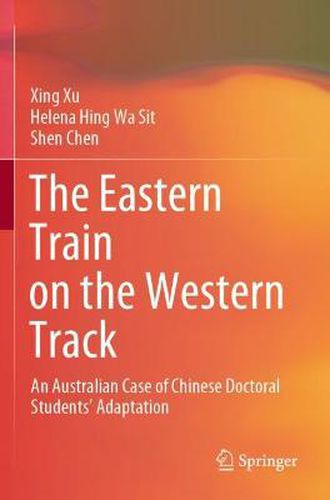Readings Newsletter
Become a Readings Member to make your shopping experience even easier.
Sign in or sign up for free!
You’re not far away from qualifying for FREE standard shipping within Australia
You’ve qualified for FREE standard shipping within Australia
The cart is loading…






This title is printed to order. This book may have been self-published. If so, we cannot guarantee the quality of the content. In the main most books will have gone through the editing process however some may not. We therefore suggest that you be aware of this before ordering this book. If in doubt check either the author or publisher’s details as we are unable to accept any returns unless they are faulty. Please contact us if you have any questions.
This book makes valuable theoretical, empirical, and methodological contributions to the study of overseas doctoral students’ cross-cultural adaptation.
Focusing on Australia, one of the top three destinations for Chinese students, this book seeks to understand how Chinese doctoral students perceive their lived experience of adapting to the academic and research environment at Australian universities.
The book presents an innovative data collection chiefly based on interviews. It probes into Chinese doctoral students’ emic perception of their cross-cultural adaptation from a human development perspective and in three main phrases: how motivated and prepared they are for their overseas stay (planning), how they experience their adaptation as active agents (implementing), and how they evaluate their overseas doctoral journey after the fact (reflecting).
Empirically speaking, its findings can help bolster the effectiveness of cross-cultural adaptation and that of the internationalisation of doctoral education. Methodologically speaking, it combines popular techniques and underused instruments such as graphics and maps to offer an in-depth portrait of the issue.
Given its content, the book is primarily intended for researchers in cultural studies and practitioners in international education, or in a broader sense for anyone who has a keen interest in how individuals navigate the learning trajectory and construe meanings in unfamiliar academic and socio-cultural settings. Though the book focuses on Australia as a case study, its findings are equally applicable to other contexts.
$9.00 standard shipping within Australia
FREE standard shipping within Australia for orders over $100.00
Express & International shipping calculated at checkout
This title is printed to order. This book may have been self-published. If so, we cannot guarantee the quality of the content. In the main most books will have gone through the editing process however some may not. We therefore suggest that you be aware of this before ordering this book. If in doubt check either the author or publisher’s details as we are unable to accept any returns unless they are faulty. Please contact us if you have any questions.
This book makes valuable theoretical, empirical, and methodological contributions to the study of overseas doctoral students’ cross-cultural adaptation.
Focusing on Australia, one of the top three destinations for Chinese students, this book seeks to understand how Chinese doctoral students perceive their lived experience of adapting to the academic and research environment at Australian universities.
The book presents an innovative data collection chiefly based on interviews. It probes into Chinese doctoral students’ emic perception of their cross-cultural adaptation from a human development perspective and in three main phrases: how motivated and prepared they are for their overseas stay (planning), how they experience their adaptation as active agents (implementing), and how they evaluate their overseas doctoral journey after the fact (reflecting).
Empirically speaking, its findings can help bolster the effectiveness of cross-cultural adaptation and that of the internationalisation of doctoral education. Methodologically speaking, it combines popular techniques and underused instruments such as graphics and maps to offer an in-depth portrait of the issue.
Given its content, the book is primarily intended for researchers in cultural studies and practitioners in international education, or in a broader sense for anyone who has a keen interest in how individuals navigate the learning trajectory and construe meanings in unfamiliar academic and socio-cultural settings. Though the book focuses on Australia as a case study, its findings are equally applicable to other contexts.